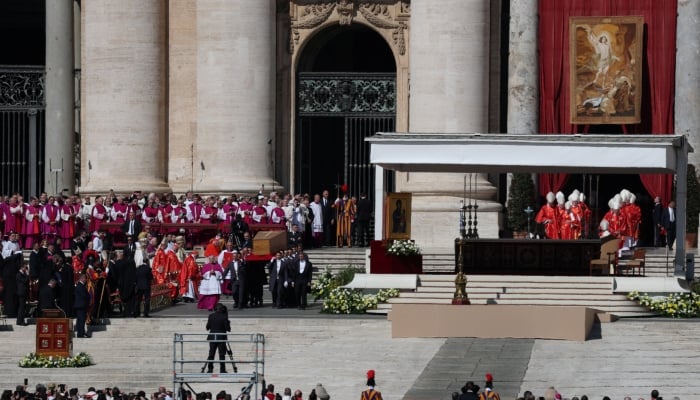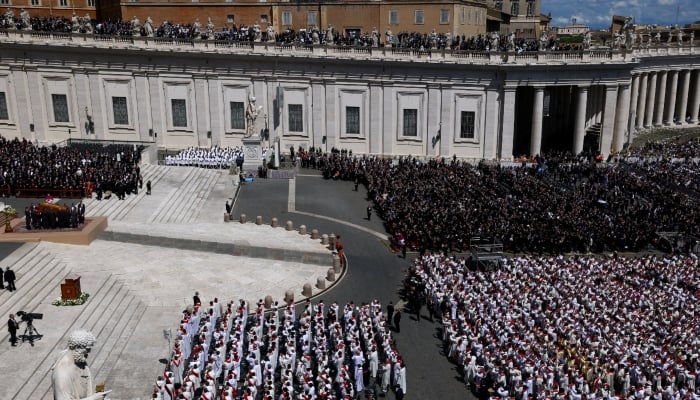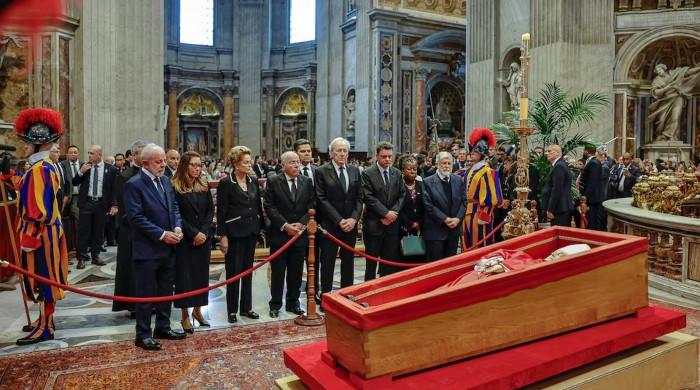Pope Francis' funeral draws thousands, cardinal says his legacy must survive
Choirs sang Latin hymns and prayers were recited in Italian, Spanish, Chinese, Portuguese and Arabic
April 26, 2025

- Presidents, royalty, pilgrims attend Pope Francis' funeral Mass.
- Pope Francis' funeral breaks tradition with burial outside Vatican.
- Huge crowds gather for funeral ceremony in St Peter's Square.
Presidents, royalty and a multitude of simple mourners bade farewell to Pope Francis on Saturday at his funeral, where a cardinal said the pontiff's legacy of caring for migrants, the downtrodden and the environment must not die with him.
On one side of Francis' coffin in the vast St Peter's Square sat United States President Donald Trump, who clashed with the pope on those issues.
On the other side sat cardinals who must decide if Francis' successor should continue with his push for a more open Church or cede to conservatives who want to return to a more traditional papacy.
"Rich in human warmth and deeply sensitive to today's challenges, Pope Francis truly shared the anxieties, sufferings and hopes of this time," said Italian Cardinal Giovanni Battista Re, who presided over the funeral Mass.
The Argentine pope, who had reigned for 12 years, died at the age of 88 on Monday after suffering a stroke.
Applause rang out at the start of the ceremony as 14 white-gloved pallbearers carried the coffin, inlaid with a large cross, out of St Peter's Basilica and into the square.
Aerial views of the Vatican showed a patchwork of colours - black from the dark garb of the world's leaders, red from the vestments of some 250 cardinals, purple worn by some of the 400 bishops and white worn by 4,000 attending priests.
Choirs sang Latin hymns and prayers were recited in various languages, including Italian, Spanish, Chinese, Portuguese and Arabic, reflecting the global reach of the 1.4-billion-member Roman Catholic Church.
The faithful hurried to St Peter's from the early hours while many camped out to try and secure spots at the front of the crowd. The Vatican estimated some 200,000 people had gathered at the start of the service.

"We want to say goodbye because he (was a) living saint, very humble and simple," said Mary James, a Franciscan nun, who had stayed up overnight to guarantee a good place.
Foreign dignatories
Francis' death ushered in a meticulously planned period of transition, marked by ancient ritual, pomp and mourning. Over the past three days, around 250,000 people filed past his body, which was laid out in an open coffin before the altar of the cavernous, 16th-century basilica.
Before taking their seats, Trump and his wife, Melania, paid their respects to Francis' coffin in St Peter's Basilica. The coffin was sealed shut on Friday night.
Among the other heads of state who flew into Rome were the presidents of Argentina, France, Gabon, Germany, the Philippines and Poland, together with the prime ministers of Britain and New Zealand, and many royals, including the king and queen of Spain.
Many people in the square clapped when Ukraine's President Volodymyr Zelensky appeared. Zelensky met Trump while both were in Rome and had a "very productive discussion" a White House official said. Their meeting came at a time when Trump is pushing for a deal to end the war in Ukraine.
Breaking tradition
Francis, the first non-European pope for almost 13 centuries, battled to reshape the Roman Catholic Church, siding with the poor and marginalised, while challenging wealthy nations to help migrants and reverse climate change.
"Francis left everyone a wonderful testimony of humanity, of a holy life and of universal fatherhood," said a formal summary of his papacy, written in Latin, and placed next to his body.
Traditionalists pushed back at his efforts to make the Church more transparent, while his pleas for an end to conflict, divisions and rampant capitalism often fell on deaf ears.
The pope shunned much of the pomp and privilege usually associated with the papacy. He carried that desire for greater simplicity into his funeral, having rewritten the elaborate, book-long funeral rites used previously.
Francis also opted to forego a centuries-old practice of burying popes in three interlocking caskets made of cypress, lead and oak. Instead, he was placed in a single, zinc-lined wooden coffin, which was sealed closed overnight.
In a further break with tradition, he will be the first pope to be buried outside the Vatican in more than a century, preferring Rome's Basilica of St Mary Major, some 5.5 kilometres (3.4 miles) from St Peter's, as his final resting place.
His tomb has just "Franciscus", his name in Latin, inscribed on the top. A reproduction of the simple, iron-plated cross he used to wear around his neck hangs above the marble slab.
The funeral motorcade will drive him through the city for one last time, allowing Romans to say farewell.
Italy mounted one of the biggest security operations the country has seen since the funeral of John Paul II. It closed the airspace over the city and called in extra security forces, with anti-aircraft missiles and patrol boats guarding the event.
As soon as Francis is buried, attention will switch to who might succeed him.
The secretive conclave to elect a successor is unlikely to begin before May 6, and might not start for several days after that, giving cardinals time to hold regular meetings beforehand to sum each other up and assess the state of the Church, beset by financial problems and ideological divisions.











